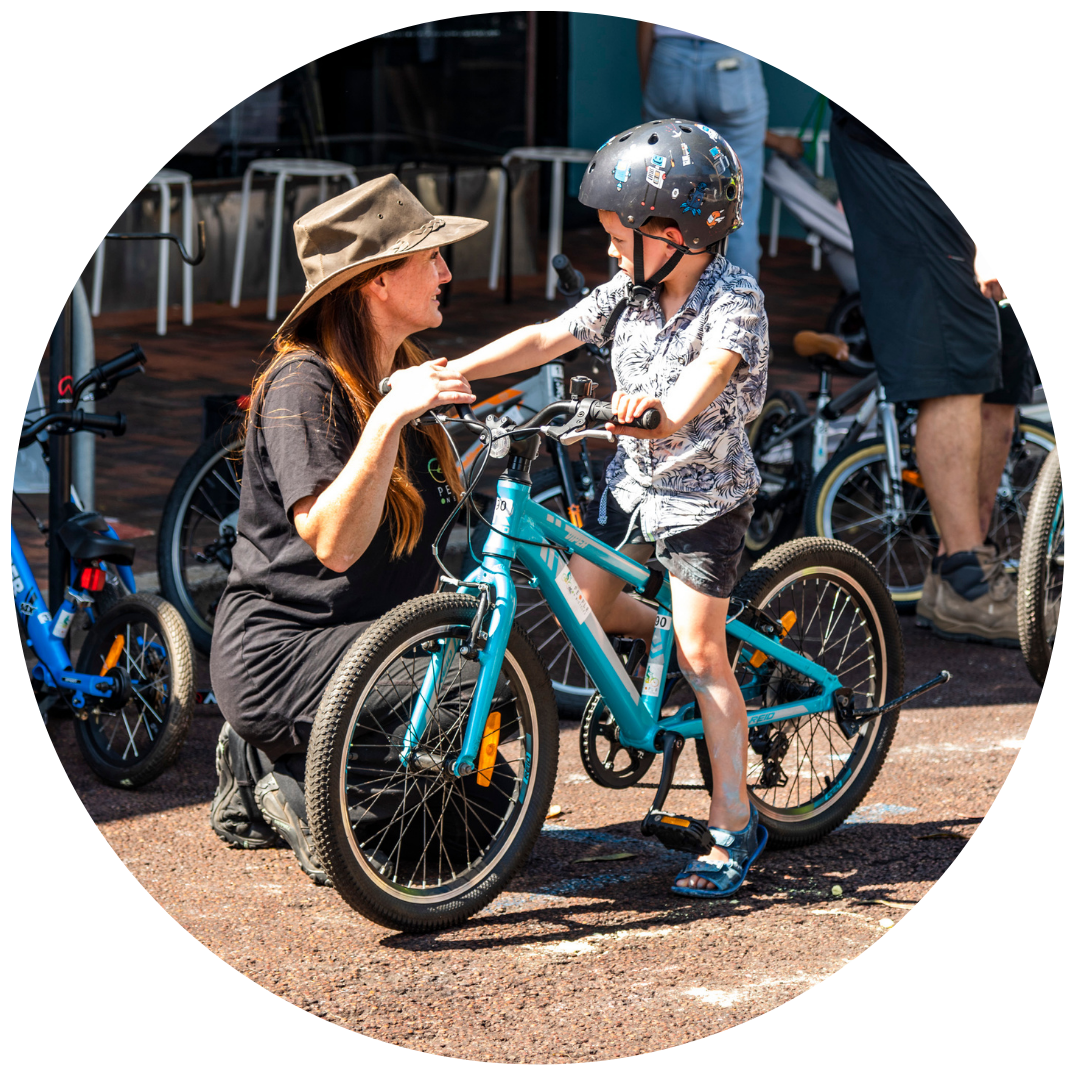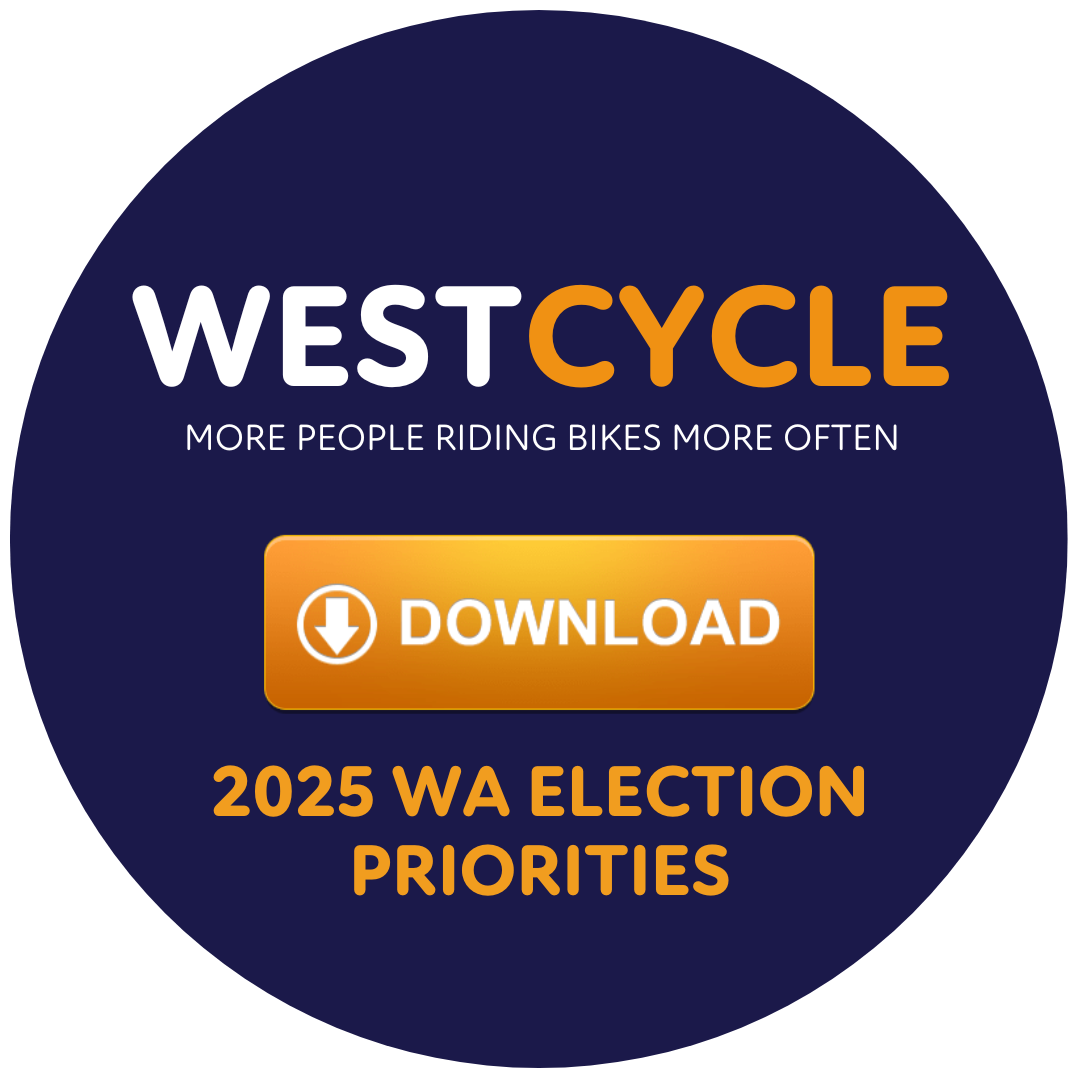2025 WA ELECTION PRIORITIES


WESTCYCLE IS ADVOCATING FOR SUSTAINED INVESTMENT IN CYCLING
FOR THE BENEFIT OF THE WHOLE COMMUNITY

WestCycle envisions a Western Australia where riding a bike is a cornerstone of daily life, reducing household transport costs and contributing to healthier communities, a sustainable environment, and offering more choices for how we get around.
Our 2025 election priorities focus on actionable goals to make bike riding safer, more accessible, and better integrated into our transport and recreation networks. It has never been a better time to invest in infrastructure that enables more people to walk, cycle and get around by other forms of micro-mobility.
By supporting bike riding, the Government can help reduce household transport costs, create jobs, and improve road safety. It will also build healthier communities, create more liveable neighbourhoods, and will provide more affordable and sustainable transport options.
WESTCYCLE ASKS THE WA GOVERNMENT TO:
- Accelerate the delivery of the Long-Term Cycle Network
- Create safer streets around schools
- Include E-bikes in the Electric Vehicle subsidy scheme
- Fund off-road Trail Maintenance

TRANSFORM TraVEL IN WA
WestCycle commends the WA Government for the record investment in bike riding in recent years, however it amounts to just 2% of the transport budget and will take decades to complete the network.
The Long-Term Cycle Network, developed in collaboration with local governments across Western Australia, is the foundation for supporting the growth of micromobility for transport. This map shows the bike routes that exist, are planned or need work in your local area.
We’ve also made it easy to look up how much of your state electorate’s Primary and Secondary routes have been constructed – and how much there is left to do.
Speeding up the delivery of the bike network would help thousands of households across WA save on fuel, parking, and car registration fees.
WestCycle asks the WA Government to:
- Set ambitious active travel targets to significantly increase the rate of walking and cycling in WA.
- Increase investment in cycling infrastructure so it constitutes 10% of the WA road budget within the next four years.
Create SAFE STREETS AROUND SCHOOLS
Despite most students living less than one kilometre from school, just 20% walk or ride to school.
The WA Government’s Active Travel to School Roadmap is a comprehensive plan to reverse the declining rates of children walking or riding to school but lacks dedicated funding.
If we want children to walk and ride to school again, we need to make it safe.
WestCycle asks the WA Government to:
- Fund the delivery of Safe Routes to School for every school in WA, by providing local governments with additional funding to upgrade safe walking/cycling routes around schools.
- Make streets surrounding schools safer by lowering speed limit to 30km/h.


ENABLE MORE AFFORDABLE AND SUSTAINABLE TRAVEL
E-bikes are a clean, affordable, and inclusive mode of transport. Queensland and Tasmania have introduced rebates on E-bikes and scooters to encourage their use.
European studies show more than 50% of e-bike trips are replacements for car trips therefore reducing congestion, pollution and transport costs. Families can save over $11,000 annually by replacing a second car with an e-bike.
A subsidy for e-bikes that meet Australian Standards and comply with local laws can improve safety and reduce battery fires by making quality e-bikes more affordable.
WestCycle asks the WA Government to:
- Include E-bikes in the EV subsidy scheme.
FUND OFF-ROAD TRAIL MAINTENANCE
Recent investment in new off-road trails is welcome but this investment should be preserved through quality maintenance. With the predominance of machine-built trails and the risks of volunteers utilising equipment, professional help is required to maintain the trails at a level to sustain tourism and safety.
An ongoing funding program for trail maintenance will ensure that trails meet best practice standards, trail users are kept safe, the environment is protected, and use of these community assets continues to grow.
WestCycle asks the WA Government to:
- Establish a $3m annual asset management fund for the landowner to work with club volunteers to engage professional teams to undertake technical and machine work to maintain existing off-road trails.


Enabling people to ride bikes more often is a low-cost and effective way to meet emissions reduction targets, improve mental and physical health, boost community connection and workplace productivity, while reducing traffic congestion and easing cost of living issues.
Investment in cycling will also make streets safer, reduce pollution, improve the quality of life, and ensure a sustainable, economically vibrant, and healthy community.
HOW YOU CAN HELP





